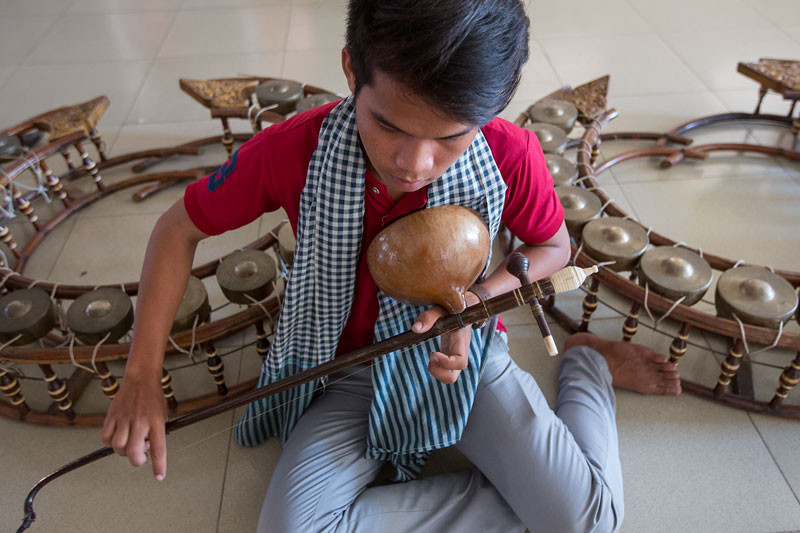With the first season of Cambodian Idol wrapping up earlier this month, introducing a new crop of aspiring pop stars to audiences across the country, the Ministry of Culture is staging its own musical competition starting today, seeking to breathe new life into some of Cambodia’s oldest art forms.
Boun Thren, 18, is among more than 40 performers from 12 provinces who will come together in Phnom Penh today to show off their talents in three art forms with deep cultural roots, but fading popularity among the masses.

“Young people are just interested in the new music,” said the native of Kompong Speu province, who plays the kse diev, an ancient one-stringed lute. “I want to help show kse diev to other people and show them that it can be interesting. I don’t want it to die off.”
In an attempt to put remaining practitioners in the spotlight, the Culture Ministry will host a two-day festival and competition with musicians who play the kse diev and the chapei dang veng, a two-stringed instrument, as well as performers of ayai roueng, a type of stylized, poetic comedy.
“We hope that through the festival the public will appreciate more about the different forms. And also to encourage young people to understand—appreciate also—to take interest in [the] practice of these art forms,” said Hab Touch, director of heritage at the Culture Ministry.
The chapei dang veng is a long, two-stringed instrument often accompanied by bluesy improvisational folk songs. The kse diev, which has been played as far back as Angkorian times, is a one-stringed lute with a gourd as its sound box. Ayai roueng generally involves two people bantering about political and historical topics through song and accented by subtle dance moves.
With all of these forms requiring artists to improvise, those taking part in this week’s competition will be given a topic and asked to perform on the fly, said Yun Khean, deputy director general of heritage at the Culture Ministry.
“The people in the competition don’t know the subject, so when they come, we choose one subject and they perform,” he said.
The concerts are set to run from 8 a.m. to around 5:30 p.m. today at the ministry’s department of performing arts. Winners will be announced on Thursday at Chaktomuk Conference Hall beginning at 4 p.m., with the top finishers performing again that evening.
While many of the masters of the three featured art forms are elderly, this week’s events will also feature a number of musicians and actors in their twenties or younger.
Van Tida, 17, and her ayai roueng partner Kong Vuth, 20, started taking ayai classes a couple of months ago and have only taken about seven formal lessons. But Ms. Tida already loves everything about it.
“It’s a kind of art, but it’s also a form of education. It’s advice to the audience,” she said. “The singing is meaningful.”
And despite being new to ayai, Ms. Tida likes her chances in today’s contest.
“I have natural talent,” she said.



